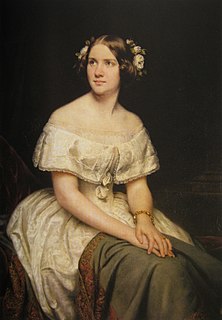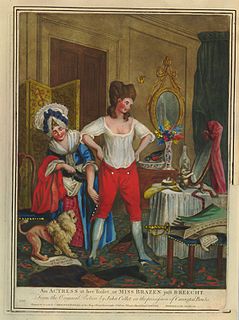Related Research Articles
A countertenor (also contra tenor) is a type of classical male singing voice whose vocal range is equivalent to that of the female contralto or mezzo-soprano voice types, generally extending from around G3 to D5 or E5, although a sopranist (a specific kind of countertenor) may match the soprano's range of around C4 to C6. Countertenors often are baritones or tenors at core, but only on rare occasions they use their lower vocal range, instead preferring their falsetto or high head voice.

Johanna Maria "Jenny" Lind was a Swedish opera singer, often called the "Swedish Nightingale". One of the most highly regarded singers of the 19th century, she performed in soprano roles in opera in Sweden and across Europe, and undertook an extraordinarily popular concert tour of the United States beginning in 1850. She was a member of the Royal Swedish Academy of Music from 1840.
The German Fach system is a method of classifying singers, primarily opera singers, according to the range, weight, and color of their voices. It is used worldwide, but primarily in Europe, especially in German-speaking countries and by repertory opera houses.

A breeches role is one in which an actress appears in male clothing. Breeches, tight-fitting knee-length pants, were the standard male garment at the time these roles were introduced. The theatrical term travesti covers both this sort of cross-dressing and also that of male actors dressing as female characters. Both are part of the long history of cross-dressing in music and opera and later in film and television.
Berthold Goldschmidt was a German Jewish composer who spent most of his life in England. The suppression of his work by Nazi Germany, as well as the disdain with which many Modernist critics elsewhere dismissed his "anachronistic" lyricism, stranded the composer in the wilderness for many years before he was given a revival in his final decade.

Rolf Liebermann, was a Swiss composer and music administrator. He served as the Artistic Director of the Hamburg State Opera from 1959–1973 and again from 1985–1988. He was also Artistic Director of the Paris Opera from 1973–1980.
Der Opernball is an operetta in three acts with music by Richard Heuberger, and libretto by Viktor Léon and Heinrich von Waldberg, based on the 1876 comedy Les Dominos roses by Alfred Delacour and Alfred Hennequin. Alexander von Zemlinsky assisted Heuberger with the orchestration. Its premiere was at the Theater an der Wien, Vienna, Austria, on 5 January 1898. The most famous number from the operetta is the waltz duet "Geh'n wir in's Chambre séparée". The operetta remains in the repertoire of German-language opera companies, such as the Vienna Volksoper.
Wolfgang Windgassen was a heldentenor internationally known for his performances in Wagner operas.

Lothar Zagrosek is a German conductor. As a youth, he sang in the Regensburg Cathedral choir, including performances as the First Boy in The Magic Flute at the 1954 Salzburg Festival. From 1962 to 1967, Zagrosek studied conducting with Hans Swarowsky, István Kertész, Bruno Maderna and Herbert von Karajan.
Gillian Keith is a Canadian/British operatic soprano, originally from Toronto, Canada, and living in London, UK.
William L. Lewis is an American operatic tenor and academic.
Ella Milch-Sheriff is an Israeli composer. Born in Haifa, Israel, Milch-Sheriff began her career as a composer at the age of 12. During her military service she composed, performed and interpreted her own songs after which she returned to classical music studying composition under the direction of Professor Tzvi Avni and graduating in composition from the Rubin Academy of Music at Tel Aviv University.

Sonntag aus Licht is an opera by Karlheinz Stockhausen in five scenes and a farewell, to a libretto written and compiled by the composer. It is the last-composed of seven operas that comprise the cycle Licht (Light). Its stage premiere in 2011 was posthumous, more than three years after the composer's death.
Der Sturm is a German-language opera in three acts by the Swiss composer Frank Martin to a libretto based on the Schlegel/Tieck German translation of Shakespeare's play The Tempest. It was premiered at the Vienna State Opera in 1955. The role of Prospero was originally conceived for Dietrich Fischer-Dieskau, but illness prevented him participating.
Franz Schubert's best-known music for the theatre is his incidental music for Rosamunde. Less successful were his many Opera and Singspiel projects. On the other hand, some of his most popular Lieder, like "Gretchen am Spinnrade," were based on texts written for the theatre.
Beatrice Cenci is an opera by German composer Berthold Goldschmidt based on the Shelley play The Cenci. Composed in 1949 to an English libretto by Martin Esslin, the opera won first prize in the Festival of Britain opera competition in 1951 but was not performed until 1988.
Reigen is a German-language opera in ten scenes by Philippe Boesmans to a libretto by Luc Bondy after Arthur Schnitzler's play La Ronde (1897). The opera was premiered at La Monnaie, Brussels in 1993.
Der Sprung über den Schatten is a 1924 opera by Ernst Krenek. The work parodied expressionism and psychoanalysis, and prefigured Jonny spielt auf in including jazz elements.
Dorothea Chryst, also Dorli-Maria Chryst is a German operatic and operetta soprano.
References
- ↑ Gramophone - Volume 74 - Page 12 1996 His operas , Der gewaltige Hahnrei and Beatrice Cenci , both dealt with abuse of women thereby also symbolically dealing with the injustice of tyranny . Difficult edges could suddenly modulate into an explosion of heart - breaking melody "